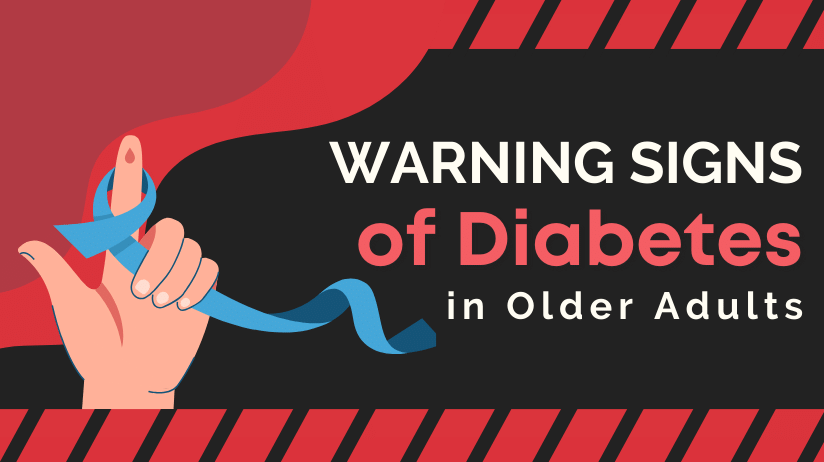
Diabetes is a global epidemic that affects millions of people worldwide.Nearly 30% of Americans over age 65 have diabetes, and this number will rise over coming years.Because diabetes symptoms can be subtle or mistaken for other health issues, many individuals go undiagnosed.Undiagnosed or unmanaged diabetes can put seniors at greater risk for serious health complications, like heart disease and kidney failure.
Thats why its important to learn about the warning signs of diabetes and take steps to detect and manage this condition.Review the infographic and learn more about the warning signs of diabetes in older adults in the text below.Share this Image On Your SiteUnderstanding DiabetesDiabetes is a metabolic disorder that occurs when the body cannot regulate blood sugar levels properly.There are two main types of diabetes: type 1 and type 2.Type 1 Diabetes: Type 1 diabetes is an autoimmune condition that typically develops in childhood.The immune system mistakenly attacks and destroys the cells in the pancreas that produce insulin.
Insulin helps maintain stable blood sugar levels.Individuals with type 1 diabetes require lifelong insulin therapy to maintain blood sugar levels.Type 2 Diabetes: This form of diabetes is more common, occurring most often in middle-aged and older adults.It is often associated with lifestyle factors such as poor diet, sedentary behavior, and obesity.In type 2 diabetes, the body doesn't produce enough insulin or becomes resistant to its effects.
Ultimately, this causes blood sugar levels to rise.Recognizing the Warning SignsEarly detection of diabetes can make a significant difference in managing the condition and preventing complications.Here are the warning signs of diabetes you and your aging loved ones should be aware of.Frequent Urination: One of the most common symptoms of diabetes is frequent urination.High blood glucose levels force the kidneys to work harder to eliminate excess glucose.
This causes the body to produce more urine.Excessive Thirst: If you find yourself drinking more fluids than usual, it could be a sign of diabetes.The body's effort to remove excess sugar through urine leaves you feeling dehydrated, triggering increased thirst.Dry Mouth: Because the body is producing more urine, you are losing more fluid than normal.You may notice a dry mouth or even dry skin as a warning sign of diabetes.Unexplained Weight Loss: Losing weight suddenly, despite eating normally, may indicate diabetes.
The body's inability to use sugar for energy can lead to the breakdown of fat and muscle tissues.Fatigue: Persistent fatigue is a common symptom of diabetes.Without sufficient sugar in your cells for energy, you'll feel tired and weak.Blurry Vision: High blood sugar levels can affect the lens in your eye, causing temporary changes in your vision.If you notice sudden blurriness, it's important to have your blood sugar levels checked.Diabetes could ultimately cause vision loss if not treated.Slow Healing Wounds: Diabetes can impair your body's ability to heal wounds and fight off infections.
If you notice that cuts or sores take longer to heal, this may be a sign of diabetes.Tingling or Numbness: Diabetes can damage nerves over time, leading to a condition called diabetic neuropathy.You might experience tingling or numbness, especially in your hands and feet.Recurrent Infections: High blood sugar levels can weaken the immune system, making you more susceptible to infections.You may get skin and urinary tract infections more easily.Yeast Infections: Both men and women with diabetes may experience frequent yeast infections, often in the genital area.Darkened Skin Patches: The bodys resistance to insulin can lead to a condition called acanthosis nigricans.
This results in darkened, velvety patches of skin, often found in the neck, armpits, and groin area.Breath Odor: Diabetes can lead to acetone-like breath odor, which is sometimes described as "fruity." This can be a sign of diabetic ketoacidosis, a life-threatening complication of diabetes.Why Early Detection MattersIf you or a loved one notices any of the warning signs above, its important to see a doctor.Early detection of diabetes is critical for several reasons:Preventing Complications: When left unmanaged, diabetes can lead to a serious health problems, including heart disease, kidney damage, nerve damage, and vision problems.Early diagnosis and management can reduce the risk of these complications.Lifestyle Changes: If you're diagnosed with prediabetes or early-stage diabetes, you can make lifestyle changes to manage the condition.
Improving your diet and increasing physical activity can help prevent the condition from worsening.Treatment Options: Diabetes is a manageable condition.Early detection allows healthcare professionals to determine the best treatment plan for your specific type and stage of diabetes.Recognizing the warning signs of diabetes is the first step in managing this chronic condition.Paying attention to your body can lead to early detection and better outcomes.
If you or someone you know is experiencing these symptoms, consult a healthcare professional for a proper diagnosis and guidance on managing diabetes.With the right care and lifestyle changes, individuals diagnosed with diabetes can lead healthy and fulfilling lives.
Publisher: Caring Senior Service ( Read More )

